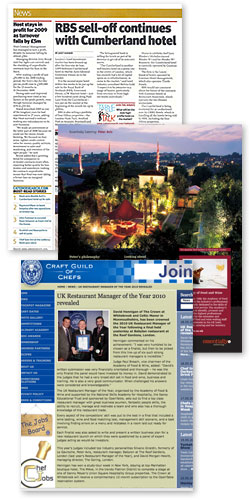Regarding the impact the Budget will have on the UK’s foodservice sector, Horizon’s Peter Backman says: “The measures taken by the Government in this week’s budget means that consumers are likely to have less money in their pockets to spend on eating out and are going to be more cautious about how they spend money they have got. The VAT rise, fall in transfer payments such as housing benefit and child allowances and continued uncertainty in the jobs market all mean that spending will be on hold for longer, so while we may have expected the market to improve towards the latter end of this year, it is unlikely to do so for a further 12-18 months.
“For operators, margins will continue to be squeezed as inflation falls and, if they don’t pass on the VAT rise in full, their profits will suffer. The reduction in capital allowances will also have a negative impact on profitability.
“The steep reduction in public spending, down by 25% up to 2015, will mean that there could be more contracts up for grabs in the contract catering sector, although margins will remain extremely tight. However, less investment in schools, hospitals and government facilities mean fewer opportunities for contractors and could mean existing contracts come up for renegotiation more quickly. (press ‘more’ for detailed analysis.
| Measure | Headline | Impact on foodservice |
| Summary
|
||
| Consumer’s discretionary income | Down | Less money to spend on eating out |
| Transfer payments to the poor | Down | Less money to spend on eating out |
| Employment | Down | Fewer people to feed at work; more consumer uncertainty |
| Overall
|
||
| GDP | Slightly worse in the short term. Office for Budget Responsibility say:
|
Less opportunity for growth |
| Household income | Down by average -£4,300 by 2014/15 | Less money for consumers to spend |
| Unemployment | Slight increase in 2010 (to max 8.1 million), falling a bit in 2011 and down to 6.1 million in 2015 | More people with less to spend and greater uncertainty about their prospects – negative impact on eating out |
| Inflation | +3% in 2010, declining in 2011, reaching 2% sometime in 2012 | Operators, and suppliers, will have to cope with squeezed margins |
| Impact on customers
|
||
| VAT | Increase by 2.5% to 20% in January 2011 | Fewer £ in consumers’ pockets – especially the poor who eat out in lower cost outlets – take aways etc |
| Cost of eating out will increase | ||
| Operators may absorb some of the increase – and will take the hit in their profits | ||
| Income tax | Some relief for low earners | Eating out spending not affected quite as much as before |
| Capital Gains Tax | Up from 18% to 28% for higher earners | May marginally reduce propensity to eat out |
| Public spending | Down by 25% up to 2015. Amounts to -£84 billion pa by 2014/15 (versus planned £52 billion by Labour) | Fewer employees to feed |
| Reductions in transfer taxes (housing benefit, child allowances etc) | Less money available for consumers to spend one eating out (amongst other things) | |
| Note: See also impact on operators | ||
| Public sector pay freeze | Less discretionary expenditure | |
| Alcohol, tobacco taxes | No further increase in duties but VAT increase will add 6p to a pint of beer in a pub | Some further price pressures for either operators to absorb or for consumers to cope with |
| Impact on operators
|
||
| Corporation Tax | Reduced by -1% pa until 2014 | Will help operators to save and/or invest |
| National insurance | Threshold increased by £21 (but employer’s NI will increase as planned) | Will help to minimise cost of employment which is nevertheless likely to increase. |
| Continuing pressure to reduce headcount | ||
| Capital allowances | Will be reduced | Currently, hotels and caters are the sector with the second highest reliance on capital allowances – currently capital allowances account for 48% of trading profit |
| Negative impact on profitability | ||
| Public spending | Down by 25% up to 2015. Amounts to -£84 billion pa by 2014/15 (versus planned £52 billion by Labour) | Probably more outsourcing business for contractors |
| Less/no investment in new build schools, hospitals, government facilities – fewer catering opportunities | ||
| Squeeze on existing outsourcing deals – potential contract renegotiations |
Source: Horizons 23 June 2010






